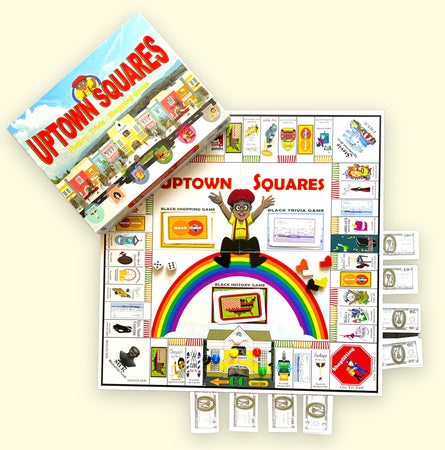5 Ways to Teach Truthful Black History Despite Political Obstacles
As parents, we understand the significance of an inclusive and balanced education for our children. However, at times, concerns may arise when we notice bias or political motivations in our child's school curriculum. Rest assured, there are proactive steps we can take to foster a more truthful and unbiased learning environment. Let's explore some practical ways to effect change and promote a well-rounded education for our children.
-
Support Teachers and Unions:
Teachers are at the forefront of education and often have valuable insights into curriculum development. Engage in open dialogue with educators and school authorities about your concerns. Supporting teachers' rights to express objections and being receptive to their input can positively influence curriculum improvements.
Here's how you can effectively provide your support:
- Advocacy and Dialogue: Engage in open conversations with teachers and union representatives about your concerns regarding the curriculum. Express your support for their efforts in providing a well-rounded and accurate education for students. Show genuine interest in their perspectives and seek common ground to address issues collaboratively.
- Attend Union Meetings: If possible, attend union meetings or events to stay informed about their initiatives and challenges. By participating, you demonstrate your solidarity with educators and their commitment to delivering truthful education.
- Publicly Acknowledge Teachers' Efforts: Praise and recognize teachers for their dedication to imparting unbiased knowledge. Write letters of appreciation to educators or share positive experiences about teachers who have gone the extra mile to teach the truth about Black history.
- Back Union Initiatives: Be aware of union-led initiatives aimed at promoting equitable education and actively support them. This may include signing petitions, attending rallies, or sharing information about their campaigns on social media.
- Stay Informed: Keep yourself updated on educational policies, budget allocations, and other issues affecting teachers and their ability to provide truthful education. Participate in local discussions and be informed about school board decisions that impact the curriculum.
-
Volunteer and Participate: Offer your time and resources to assist teachers and unions in organizing events or activities related to promoting truthful education. Collaborate with them to host workshops or presentations on Black history or related topics.
-
Engage with Churches:
Local churches can play a vital role in promoting truthful education, especially in religious and cultural histories. Explore educational programs within your faith community that focus on historical context, values, and inclusive teachings.
Here's how you can make the most of this collaboration:
- Resource Sharing: Work with churches to curate educational resources that can supplement school curricula. Share books, documentaries, and online resources that accurately portray Black history and culture.
- Educational Partnerships: Foster partnerships between schools and local churches to promote truthful Black history education. Encourage churches to host educational workshops, seminars, or guest speakers who can provide historical context and insights on important events and figures.
- Cultural Celebrations: Participate in or support cultural celebrations hosted by churches that highlight the richness and significance of Black history. Such events can create opportunities for dialogue and understanding among diverse communities.
- Church Outreach Programs: Collaborate with churches on outreach programs that address historical misconceptions and encourage open conversations about the contributions of Black individuals to society.
-
Youth Engagement: Work with church youth groups to create awareness campaigns or projects that emphasize the importance of truthful education and inspire action for positive change.
-
Collaborate with Community Organizations:
Join forces with local community organizations advocating for unbiased education. These groups often host workshops, seminars, and discussions, creating opportunities to address curriculum concerns collectively.
Here's how you can effectively engage with these organizations to promote truthful Black history education:
- Identify Reputable Organizations: Seek out local community organizations with a focus on education, social justice, or cultural diversity. Look for groups that share similar goals and values regarding truthful education.
- Mentorship and Role Models: Engage community leaders and members as mentors or role models for students, especially those from underrepresented communities. Their stories and experiences can inspire and empower the next generation.
- Fundraising for Education Initiatives: Collaborate on fundraising events or campaigns to support initiatives focused on truthful Black history education. The funds raised can be used to provide resources or scholarships for further learning.
- Library and Resource Sharing: Work together to curate a collection of books, documentaries, and educational materials on truthful Black history. Share these resources with schools and educators to supplement the curriculum.
- Join Existing Initiatives: Participate in ongoing initiatives and projects run by community organizations that promote truthful Black history education. These could include workshops, seminars, or events that aim to raise awareness about historical inaccuracies.
- Community Forums and Discussions: Attend community forums and discussions organized by these organizations to share your concerns about biased content in school curricula. Exchange ideas with others on how to effect change collectively.
- Advocacy and Awareness Campaigns: Collaborate on advocacy and awareness campaigns that highlight the importance of accurate Black history education. Utilize social media platforms and local media to amplify the message.
-
Promote Teacher Training: Advocate for teacher training programs focused on promoting inclusivity, cultural sensitivity, and the teaching of accurate Black history. Community organizations can play a crucial role in providing expertise for such training.
-
Exercise Your Voting Rights:
Participate in local and federal elections, ensuring you support candidates who prioritize equitable education and are committed to addressing curriculum biases. Your vote can help shape policies that promote diverse perspectives and accurate historical representation.
Here's how you can effectively ensure that our collective voice is heard in shaping a more inclusive and equitable education system:
- Stay Informed and Educate Others: First and foremost, stay informed about upcoming elections, including local school board elections, as they directly impact education policies. Educate your friends, family, and community members about the importance of voting and how it influences educational decisions.
- Lead by Example: Demonstrate your commitment to exercising your voting rights by casting your vote in every election, no matter how big or small. When others see your dedication, it can motivate them to follow suit.
- Host Voter Registration Drives: Organize voter registration drives in your community or school to make it easier for eligible voters, especially young people who may be voting for the first time, to register and participate in the democratic process.
- Address Barriers to Voting: Identify and address barriers that may prevent people from voting, such as lack of transportation or access to polling stations. Offer assistance to those who need help getting to the polls.
- Encourage Early and Mail-In Voting: Inform others about the benefits of early and mail-in voting, which can provide more flexibility for busy schedules and increase voter turnout.
- Share Information on Candidates and Issues: Provide unbiased information about the candidates running for office and the issues that affect education. Help others understand the impact their vote can have on shaping educational policies.
- Volunteer for Voter Outreach: Join local campaigns or non-partisan organizations that focus on voter outreach. Offer your time to encourage voter registration and participation in elections.
- Utilize Social Media: Leverage social media platforms to share voting information, voting deadlines, and the importance of voting for education. Encourage your followers to share the information with their networks.
- Share Success Stories: Highlight the positive impact of voting on educational policies by sharing success stories of schools or districts that have benefited from community engagement in the voting process.
-
Organize Voting Parties: Turn voting into a social event by organizing voting parties with friends and family. After casting their ballots, participants can celebrate their civic duty together.
-
Foster Truthful Learning at Home:
Complement your child's education by teaching them to think critically and seek the truth. Encourage open conversations about historical events and cultural diversity. Emphasize the importance of understanding various perspectives to form well-informed opinions.
Here's how you can effectively encourage truthful learning with your children:
- Open and Honest Conversations: Encourage open discussions with your children about history, including Black history. Address their questions honestly and provide age-appropriate information that reflects diverse perspectives.
- Diverse Reading Materials: Fill your home library with books that celebrate Black history and culture. Offer a wide range of literature that highlights the achievements and struggles of Black individuals throughout history.
- Educational Media: Use documentaries, educational videos, and online resources that showcase truthful accounts of Black history. Watch them together as a family to spark meaningful conversations and promote understanding.
- Cultural Celebrations: Participate in cultural celebrations that honor Black history and heritage. Attend local events, art exhibitions, or performances that showcase the contributions of Black artists, writers, and activists.
- Interactive Learning: Engage in interactive learning activities that make Black history come alive for your children with activities such as playing our board game Uptown Squares. Players ask questions, seek solutions, and discuss their findings, creating an enriching atmosphere for meaningful conversations about the impact of Black individuals on society.
As parents, we have the power to influence the education system positively. By actively supporting teachers, engaging with churches, collaborating with community organizations, voting for education-driven candidates, and fostering truth-seeking habits at home, we can inspire a more balanced and unbiased curriculum. Let us work together to ensure our children receive the education they deserve—one that empowers them with knowledge, critical thinking, and a commitment to truth.


